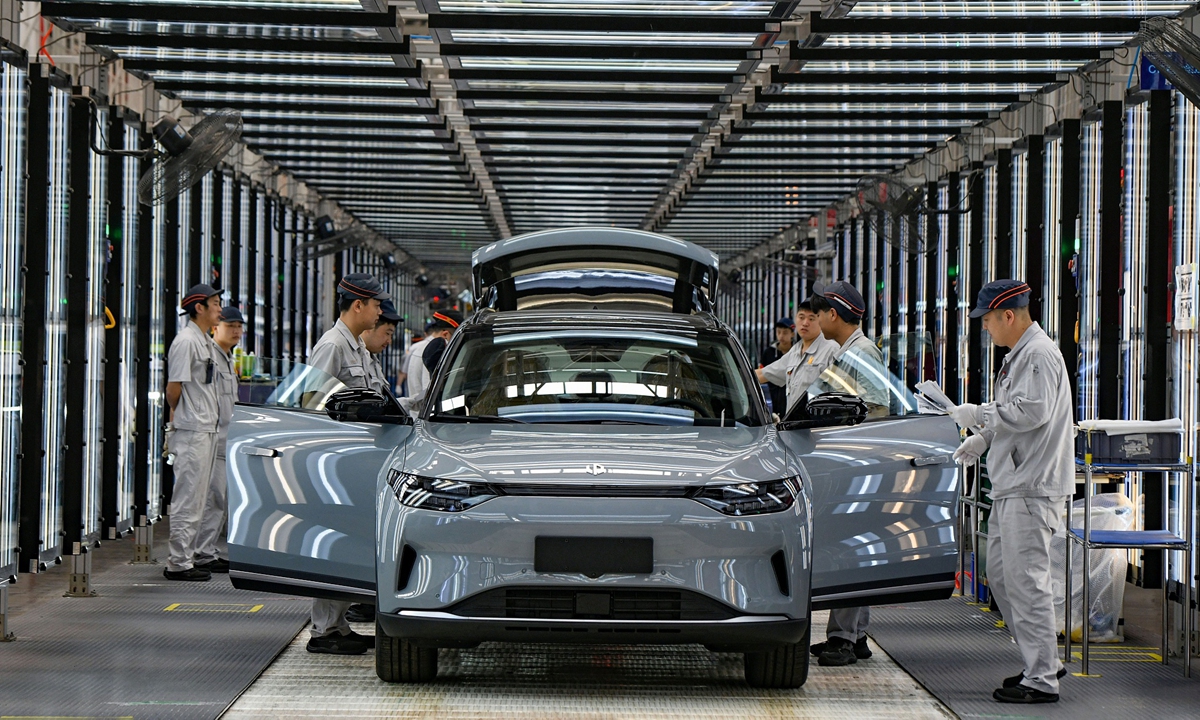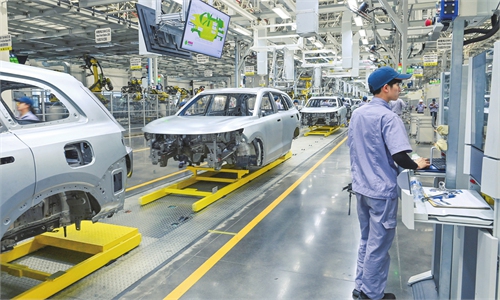French carmaker to deepen ties with Chinese battery giant despite pressure from EU's protectionist move

Workers complete assembling an electric vehicle (EV) at China's EV start-up Leapmotor in Jinhua, East China's Zhejiang Province on April 1, 2024. The smart EV factory delivered 14,567 new vehicles in March, a yearly increase of 136 percent. Photo: VCG
French carmaker Renault Group said on Monday that its electric vehicle (EV) subsidiary Ampere will work with Chinese battery manufacturer Contemporary Amperex Technology Co (CATL) and South Korea's LG Energy Solution to adopt cheaper and more advanced manufacturing technologies for EV components, in order to stay competitive in the EV market.
Chinese experts said Renault's move is part of the trend of foreign carmakers looking to deepen connections with China's advanced EV technology suppliers, despite intensified protectionist moves taken by the EU targeting China's EV industry.
Enhanced cooperation between China and Europe is beneficial for accelerating the green transformation of the European automotive industry players, and for increasing their market competitiveness in the global stage, experts said.
Ampere, the European EV player, announced on Monday that it will work hand in hand with its suppliers CATL and LG Energy Solution to set up an integrated value chain on the European continent to ensure the most competitive LFP (Lithium Iron Phosphate) technology for its vehicles manufactured in Europe.
With these technologies, Ampere will reduce the cost of batteries used in its vehicles by around 20 percent from the beginning of 2026, according to the French company.
By leveraging affordable components like batteries and tapping into China's well-established industrial supply chain, European industry players such as Renault Group can increase production volume and enhance cost-effectiveness, An Qi, an expert at the Energy Research Institute from the Chinese Academy of Macroeconomic Research, told the Global Times on Tuesday.
The French carmaker's move is the latest example of how foreign companies are embracing the opportunities arising from deepening cooperation with advanced Chinese EV industry players.
China holds a dominant position in the new-energy vehicle (NEV) supply chain due to its diversified battery technologies. Earlier at Beijing Auto Show 2024, which took place from April 25 to May 5, CATL showcased its latest LFP battery. The company says it has an energy density of 205 watt-hours per kilogram, almost 8 percent higher than the current state of the art for such batteries, German photovoltaic industry publication PV Magazine reported.
The rapid development of Chinese EV makers is clear from their booming sales, underscoring the robust market demand both at home and overseas.
According to the latest production and sales data released on Monday by BYD, China's leading NEV carmaker, cumulative sales of BYD's NEVs reached 341,658 units in June, marking a 35.02 percent increase year-on-year and a slight month-on-month increase of 2.97 percent from May.
It is worth noting that this sales volume surpassed the 341,043 units the company sold in December 2023, once again setting a new monthly sales record for BYD.
The robust Chinese EV industry has encouraged other countries to follow suit and has boosted market confidence. Luca de Meo, CEO of Renault Group, told the Chinese tech news portal 36Kr that he valued the advanced nature of China's EV industry, underscoring the importance the company attaches to increasing collaboration with Chinese partners.
Meanwhile, the world's leading automakers such as BMW Group have increased their investment in the China market for greater opportunities, exemplified by its announced plans to invest an additional 20 billion yuan ($3.12 billion) into its production base in Shenyang, Northeast China's Liaoning Province.
The rapid development of Chinese NEVs comes as the European Commission announced on June 12 provisional measures including plans to levy, starting in early July, temporary countervailing duties ranging from 17.4 percent to 38.1 percent on EVs originating in China despite widespread opposition from officials and businesspeople from both Chinese and international communities, including those within the EU.
The recent EU decision to impose additional tariffs on Chinese EVs is "a threat" to global efforts toward green transformation, said Chinese experts, adding that the move comes from protectionism rather than fair market competition, with the malicious intention of suppressing the development of China's EV industry and preventing China-made EVs from entering the EU market.
"It is not beneficial for Europe itself, not conducive to China-EU trade, and also detrimental to Europe and even global green transformation," An noted.
Despite the trade tensions, China continues to advocate open and fair cooperation with the EU, while countries like Germany have established strong ties with China in the automotive industry, with car manufacturers such as BMW and Volkswagen expanding their presence in China's EV market.

